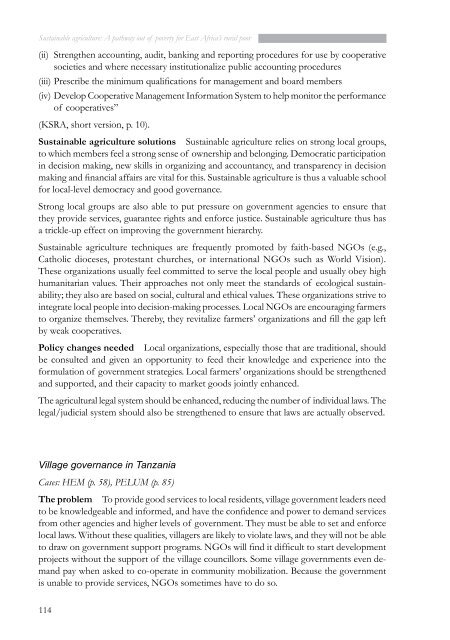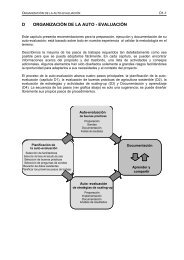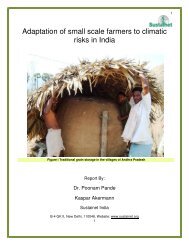cases from tanzania - Sustainet
cases from tanzania - Sustainet
cases from tanzania - Sustainet
You also want an ePaper? Increase the reach of your titles
YUMPU automatically turns print PDFs into web optimized ePapers that Google loves.
Sustainable agriculture: A pathway out of poverty for East Africa’s rural poor<br />
(ii) Strengthen accounting, audit, banking and reporting procedures for use by cooperative<br />
societies and where necessary institutionalize public accounting procedures<br />
(iii) Prescribe the minimum qualifications for management and board members<br />
(iv) Develop Cooperative Management Information System to help monitor the performance<br />
of cooperatives”<br />
(KSRA, short version, p. 10).<br />
Sustainable agriculture solutions Sustainable agriculture relies on strong local groups,<br />
to which members feel a strong sense of ownership and belonging. Democratic participation<br />
in decision making, new skills in organizing and accountancy, and transparency in decision<br />
making and financial affairs are vital for this. Sustainable agriculture is thus a valuable school<br />
for local-level democracy and good governance.<br />
Strong local groups are also able to put pressure on government agencies to ensure that<br />
they provide services, guarantee rights and enforce justice. Sustainable agriculture thus has<br />
a trickle-up effect on improving the government hierarchy.<br />
Sustainable agriculture techniques are frequently promoted by faith-based NGOs (e.g.,<br />
Catholic dioceses, protestant churches, or international NGOs such as World Vision).<br />
These organizations usually feel committed to serve the local people and usually obey high<br />
humanitarian values. Their approaches not only meet the standards of ecological sustainability;<br />
they also are based on social, cultural and ethical values. These organizations strive to<br />
integrate local people into decision-making processes. Local NGOs are encouraging farmers<br />
to organize themselves. Thereby, they revitalize farmers’ organizations and fill the gap left<br />
by weak cooperatives.<br />
Policy changes needed Local organizations, especially those that are traditional, should<br />
be consulted and given an opportunity to feed their knowledge and experience into the<br />
formulation of government strategies. Local farmers’ organizations should be strengthened<br />
and supported, and their capacity to market goods jointly enhanced.<br />
The agricultural legal system should be enhanced, reducing the number of individual laws. The<br />
legal/judicial system should also be strengthened to ensure that laws are actually observed.<br />
Village governance in Tanzania<br />
Cases: HEM (p. 58), PELUM (p. 85)<br />
The problem To provide good services to local residents, village government leaders need<br />
to be knowledgeable and informed, and have the confidence and power to demand services<br />
<strong>from</strong> other agencies and higher levels of government. They must be able to set and enforce<br />
local laws. Without these qualities, villagers are likely to violate laws, and they will not be able<br />
to draw on government support programs. NGOs will find it difficult to start development<br />
projects without the support of the village councillors. Some village governments even demand<br />
pay when asked to co-operate in community mobilization. Because the government<br />
is unable to provide services, NGOs sometimes have to do so.<br />
114




